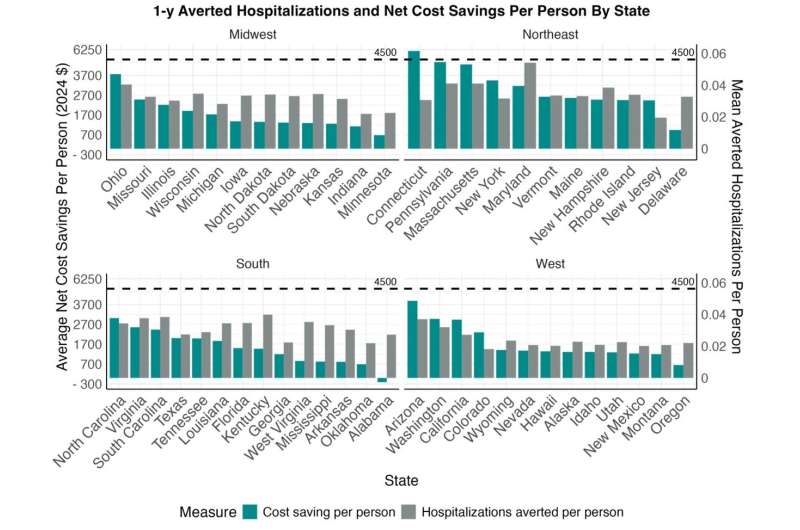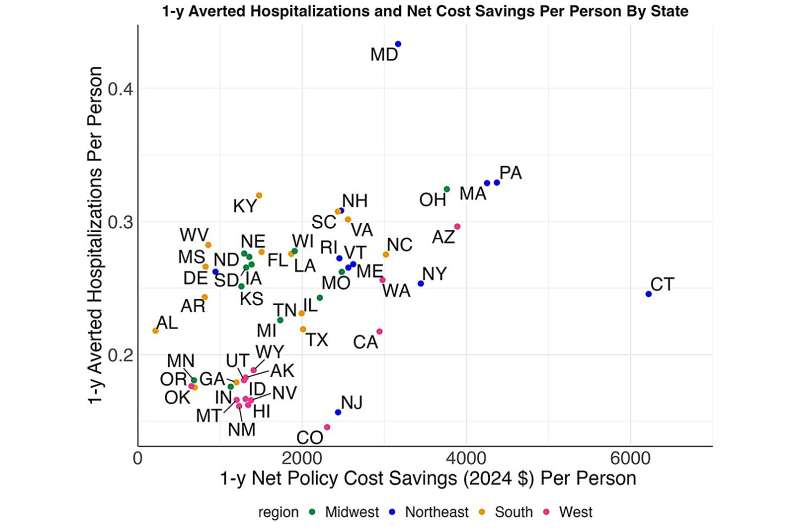This article has been reviewed according to Science X's editorial process and policies. Editors have highlighted the following attributes while ensuring the content's credibility:
fact-checked
trusted source
proofread
Study suggests states could cut health care costs by delivering patient tailored meals

According to new research looking at every U.S. state, programs that deliver medically tailored meals (MTMs) to people with diet-sensitive conditions such as diabetes and heart disease along with limitations in the ability to perform daily activities could lead to substantial savings in health care costs.
Using computer models to estimate the benefits of such programs minus the expense of implementing them, researchers found significant variation between U.S. states but an overall net cost savings in almost every state.
"By conducting a comprehensive analysis that considers the diversity in state health care systems and patient demographics, the study highlights the potential financial benefits of MTMs," said Shuyue Deng, a doctoral student at the Gerald J. and Dorothy R. Friedman School of Nutrition Science and Policy at Tufts University and lead author.
"The preliminary results indicate MTMs could significantly reduce health care costs and hospitalizations in almost every state."
Deng is presenting the findings at NUTRITION 2024, the flagship annual meeting of the American Society for Nutrition held June 29–July 2 in Chicago.
A person's diet affects the severity and trajectory of many chronic health conditions such as diabetes, heart disease, cancer, chronic kidney disease and HIV, but it can be challenging for patients to obtain and prepare the foods they need to best manage their condition. MTM programs deliver ready-to-eat meals directly to patients' homes.
The meals are selected and prepared according to customized meal plans designed by dietitian nutritionists based on each person's health conditions and nutritional needs. Such programs have been proposed and pilot-tested in various areas but are not currently widely implemented in the United States.
By helping patients consume a diet that is optimized for them, MTMs can help to prevent chronic conditions from worsening and reduce the need for costly hospital visits and treatments. In addition, meal deliveries can improve patients' independence and quality of life, and they can be especially helpful for people who face challenges with daily tasks such as shopping and cooking.
The costs associated with MTMs include the cost of producing and delivering the meals, the cost of hiring dietitian nutritionists and the administrative cost of managing the programs.

To estimate the overall financial impacts of MTMs in each state, the researchers analyzed data from nearly 7 million U.S. adults with diet-sensitive chronic diseases and used a computer simulation to model how implementing MTMs for these patients would be expected to change annual health program costs, hospitalizations and health care expenditures in each U.S. state, compared to the base scenario of current care without MTMs.
The researchers estimated the impact based on previously reported MTM programs that provided about 10 meals per week for an average of eight months per year.
Accounting for implementation costs, the projections indicated that MTMs would generate net cost savings across all states except Alabama. Per patient treated, the largest projected net annual savings were in Connecticut ($6,219), followed by Pennsylvania ($4,370), Massachusetts ($4,251) and Arizona ($3,889). Oregon ($651) and Alabama ($-214) were projected to see the lowest net annual cost savings per patient treated.
Differences in baseline health care costs and in the number of people eligible for MTMs account for some of the differences in projections from state to state.
The researchers also assessed the number of eligible patients in each state. For example, they estimated that California has the largest population of patients who would be eligible for MTM treatment (over 1,220,000 patients) and Alaska has the smallest (around 17,800), based on eligibility for people with diet-sensitive chronic conditions who also have limited ability to perform daily activities.
"These variations across states provide insights for state-level policymakers and health plan administrators," said Dariush Mozaffarian, MD, Ph.D., a cardiologist, public health scientist and Director of the Food is Medicine Institute at the Friedman School.
"Our new findings highlight the potential benefits of incorporating MTMs into state-level health care strategies, such as Medicaid 1115 waivers 'in lieu of services,' Medicare Shared Savings programs and Accountable Care Organizations, as well as commercial insurance plans."
To further refine the projections and inform decision making, the researchers plan to examine additional factors that may contribute to the variation in program costs, such as varying food costs, in different states.
More information: Deng presents this research at 12:45–1:45 p.m. CDT on Monday, July 1, during the Policies and Regulations poster session in McCormick Place (abstract; presentation details).



















